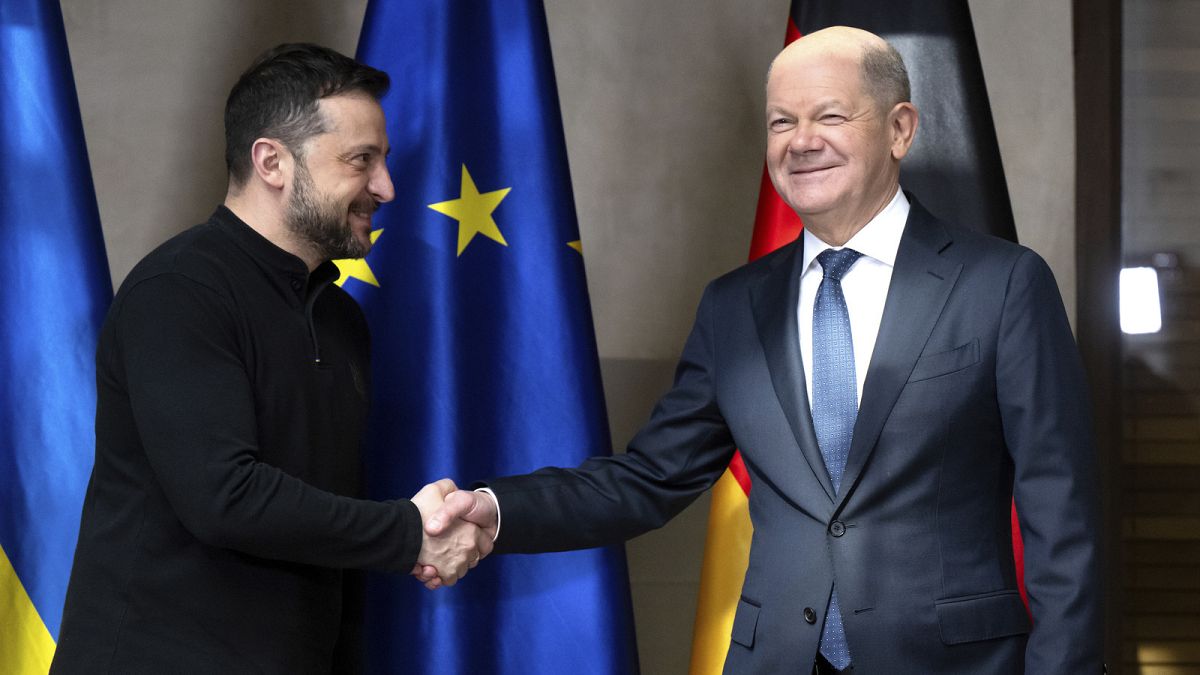Misleading claims targeting the German chancellor have been spreading online days before German voters head to the polls to elect a new government.
German Chancellor Olaf Scholz has not ordered a state of emergency in Germany over the US’s bilateral peace negotiations with Russia, despite the claim spreading widely across social platforms.
Users on X, Facebook, Instagram and TikTok falsely accused Scholz of urging parliament to impose a state of emergency — known as “Notstand” in German — that would severely curtail citizens’ rights.
But a closer look at Scholz’s speech reveals he was referring to “Notlage”, an entirely different concept in the German Basic Law that refers to an urgent situation, but which is not synonymous with a government-imposed state of emergency.
Speaking over the weekend as the Trump administration geared for talks with Russian officials in the Saudi Arabian capital, Riyadh, Scholz said: “The Bundestag should pass a resolution as soon as possible according to which the war in Ukraine and its serious consequences for the security of Germany and Europe are classified as an emergency (Notlage) within the meaning of Article 115 paragraph two of the Basic Law.”
The article referenced by Scholz states that natural disasters or “exceptional emergency situations” can justify changes to the country’s so-called debt brake, allowing the government to borrow beyond the credit limit.
What is the debt brake and how could it be used to finance defence spending?
Germany has strict limits on government borrowing, known as a debt brake. It’s aimed at restricting the budget deficit to less than 0.35% of the country’s annual gross domestic product (GDP).
The debt brake became legally binding for the government in 2016 and for the federal states in 2020.
In recent months, both Scholz’ Social Democrats (SPD) and the Greens have advocated for suspending the debt brake in response to the war in Ukraine and the ensuing energy crisis.
Scholz’s other coalition partners, the pro-business Free Democrats (FDP), fiercely opposed the move, contributing to a breakdown in trust that collapsed the three-way coalition government last November.
Scholz has said he expects the next government, which will be elected on Sunday, to trigger this article to ramp up its spending on defence and security.
The Christian Democrats’ Friedrich Merz, who is tipped to become the next German chancellor, has also expressed openness to loosening the debt brake once other options have been exhausted.
This is despite a broad camp of his CDU party opposing any changes to Germany’s strict borrowing limits.
Misleading claims spread days before crunch vote
The misleading claims targeting Scholz come days before German voters head to the ballot boxes to elect a new government.
The Conservative Christian Democrats (CDU/CSU) are poised to emerge as the biggest party and form a government, but could be forced to rely on the support of Scholz’s Social Democratic Party to do so.
The far-right Alternative for Germany (AfD) party is currently polling in second place.
There is concern that coordinated misinformation campaigns, including those engineered by the Kremlin, could put the integrity of the vote at risk.
A German non-profit has detected Russia’s well-known “Doppelgänger” campaign resurfacing, cloning the websites of renowned media outlets by purchasing similar-looking domains to spread falsified news articles.
The European Commission has attempted to minimise risks by engaging with social media platforms, including in a roundtable in Berlin and a recent stress test of their of their risk mitigation measures.
Read the full article here


